Education for Nursing Practices: Dementia Care and HRQoL
VerifiedAdded on 2023/01/06
|13
|1151
|39
Presentation
AI Summary
This presentation focuses on education for nursing practices in dementia care. It begins by defining dementia and highlighting the importance of education in nursing practice. The presentation covers learning outcomes, including identifying dementia symptoms, explaining cognitive and behaviorism theories, classifying learning models, and assessing the quality of life for patients under dementia care. The lesson content emphasizes the application of learning theories, particularly behaviorism and cognitive theory, to improve patient outcomes. The assessment of the Health-Related Quality of Life (HRQoL) model is discussed, including different dimensions and assessment methods like interpolation techniques and the use of lookup tables. Tools for HRQoL assessment, such as Patient Reported Outcomes (PROs), are also explored. The importance of education strategies, diagnostic reasoning, and clinical teaching skills is highlighted. The presentation emphasizes the role of skills, questioning, and feedback mechanisms in enhancing the quality of services and improving patient recovery. References from key scholarly articles are included to support the presentation's content.
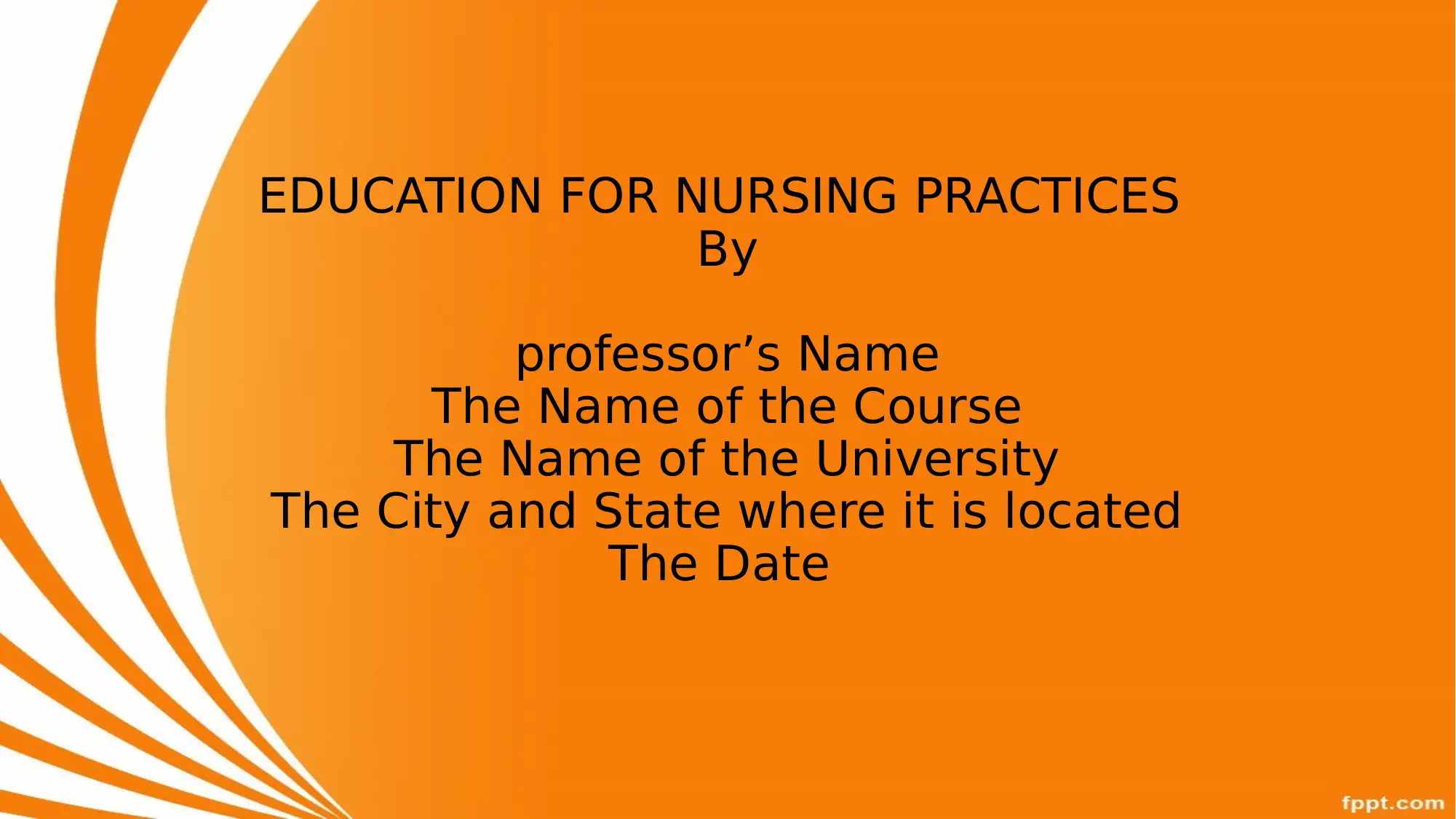
EDUCATION FOR NURSING PRACTICES
By
professor’s Name
The Name of the Course
The Name of the University
The City and State where it is located
The Date
By
professor’s Name
The Name of the Course
The Name of the University
The City and State where it is located
The Date
Paraphrase This Document
Need a fresh take? Get an instant paraphrase of this document with our AI Paraphraser
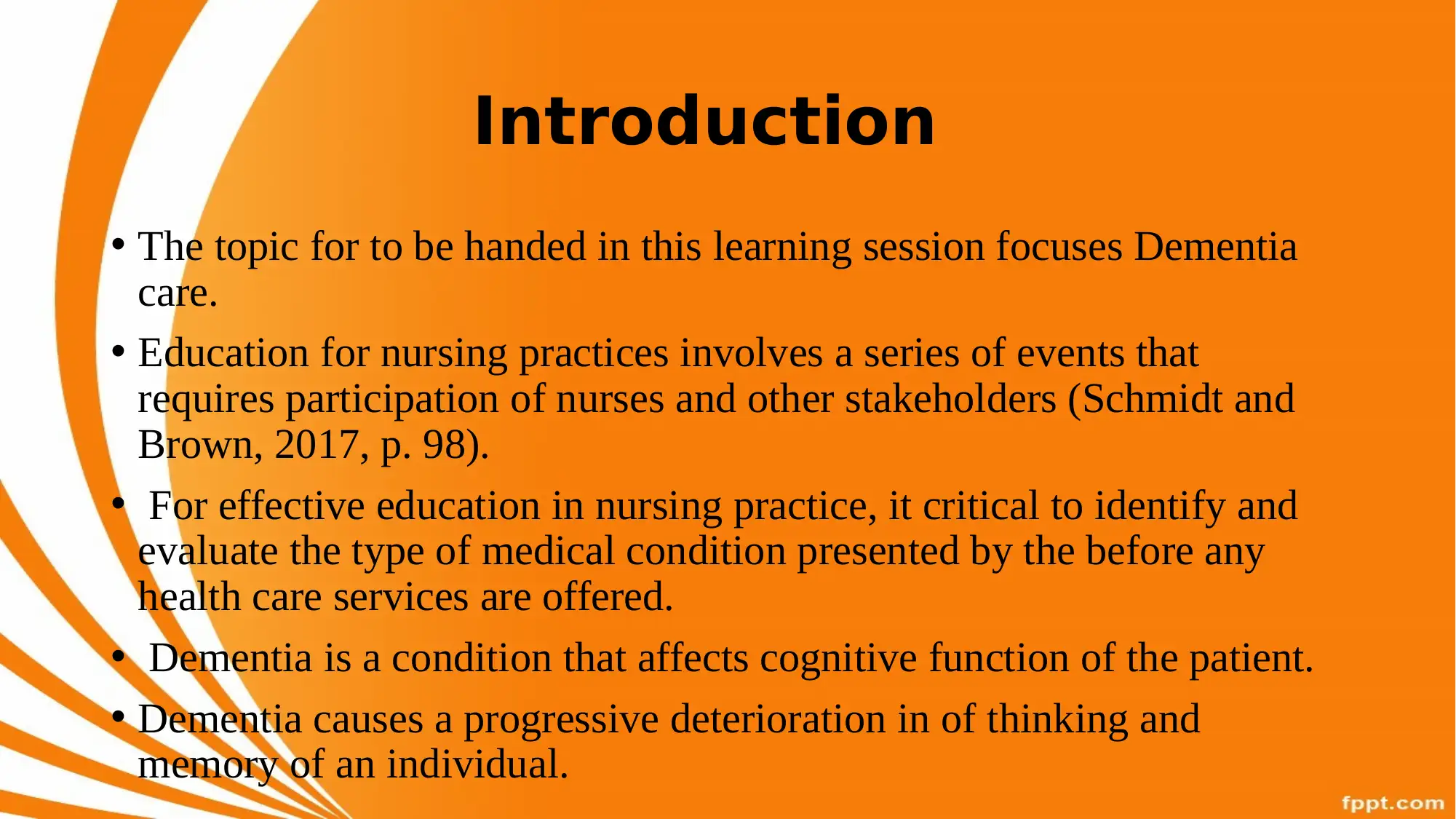
Introduction
• The topic for to be handed in this learning session focuses Dementia
care.
• Education for nursing practices involves a series of events that
requires participation of nurses and other stakeholders (Schmidt and
Brown, 2017, p. 98).
• For effective education in nursing practice, it critical to identify and
evaluate the type of medical condition presented by the before any
health care services are offered.
• Dementia is a condition that affects cognitive function of the patient.
• Dementia causes a progressive deterioration in of thinking and
memory of an individual.
• The topic for to be handed in this learning session focuses Dementia
care.
• Education for nursing practices involves a series of events that
requires participation of nurses and other stakeholders (Schmidt and
Brown, 2017, p. 98).
• For effective education in nursing practice, it critical to identify and
evaluate the type of medical condition presented by the before any
health care services are offered.
• Dementia is a condition that affects cognitive function of the patient.
• Dementia causes a progressive deterioration in of thinking and
memory of an individual.
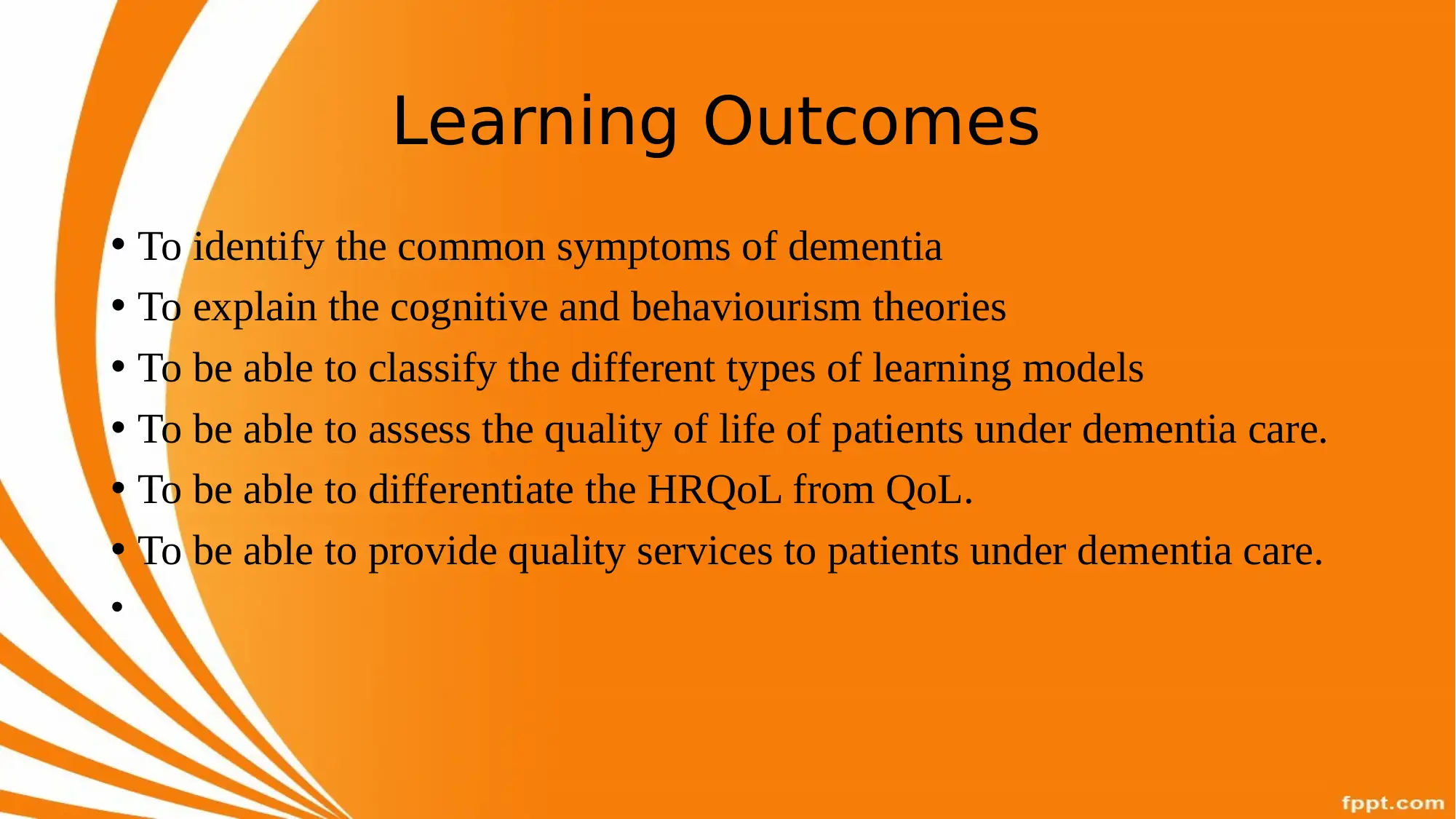
Learning Outcomes
• To identify the common symptoms of dementia
• To explain the cognitive and behaviourism theories
• To be able to classify the different types of learning models
• To be able to assess the quality of life of patients under dementia care.
• To be able to differentiate the HRQoL from QoL.
• To be able to provide quality services to patients under dementia care.
•
• To identify the common symptoms of dementia
• To explain the cognitive and behaviourism theories
• To be able to classify the different types of learning models
• To be able to assess the quality of life of patients under dementia care.
• To be able to differentiate the HRQoL from QoL.
• To be able to provide quality services to patients under dementia care.
•
⊘ This is a preview!⊘
Do you want full access?
Subscribe today to unlock all pages.

Trusted by 1+ million students worldwide
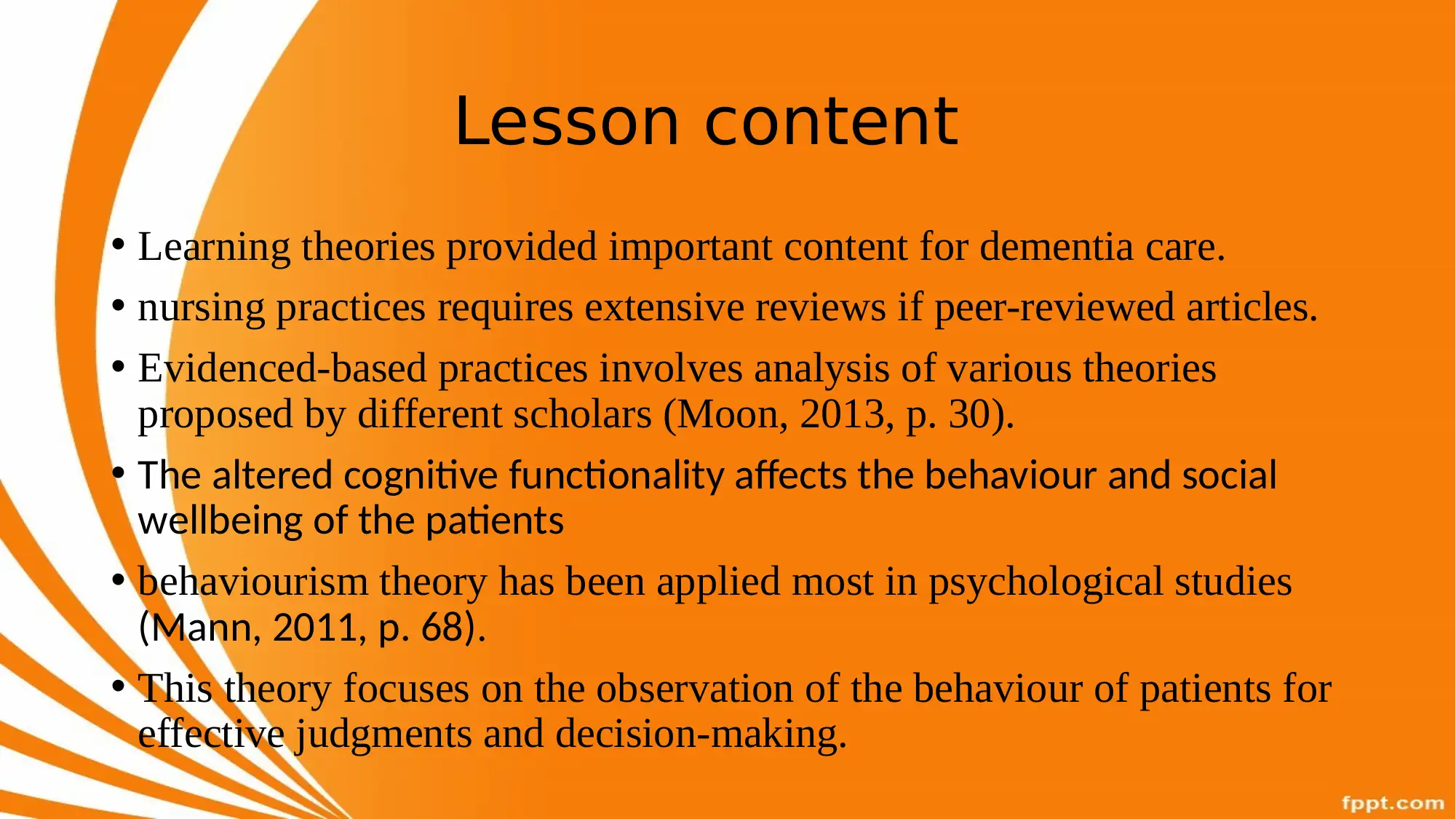
Lesson content
• Learning theories provided important content for dementia care.
• nursing practices requires extensive reviews if peer-reviewed articles.
• Evidenced-based practices involves analysis of various theories
proposed by different scholars (Moon, 2013, p. 30).
• The altered cognitive functionality affects the behaviour and social
wellbeing of the patients
• behaviourism theory has been applied most in psychological studies
(Mann, 2011, p. 68).
• This theory focuses on the observation of the behaviour of patients for
effective judgments and decision-making.
• Learning theories provided important content for dementia care.
• nursing practices requires extensive reviews if peer-reviewed articles.
• Evidenced-based practices involves analysis of various theories
proposed by different scholars (Moon, 2013, p. 30).
• The altered cognitive functionality affects the behaviour and social
wellbeing of the patients
• behaviourism theory has been applied most in psychological studies
(Mann, 2011, p. 68).
• This theory focuses on the observation of the behaviour of patients for
effective judgments and decision-making.
Paraphrase This Document
Need a fresh take? Get an instant paraphrase of this document with our AI Paraphraser
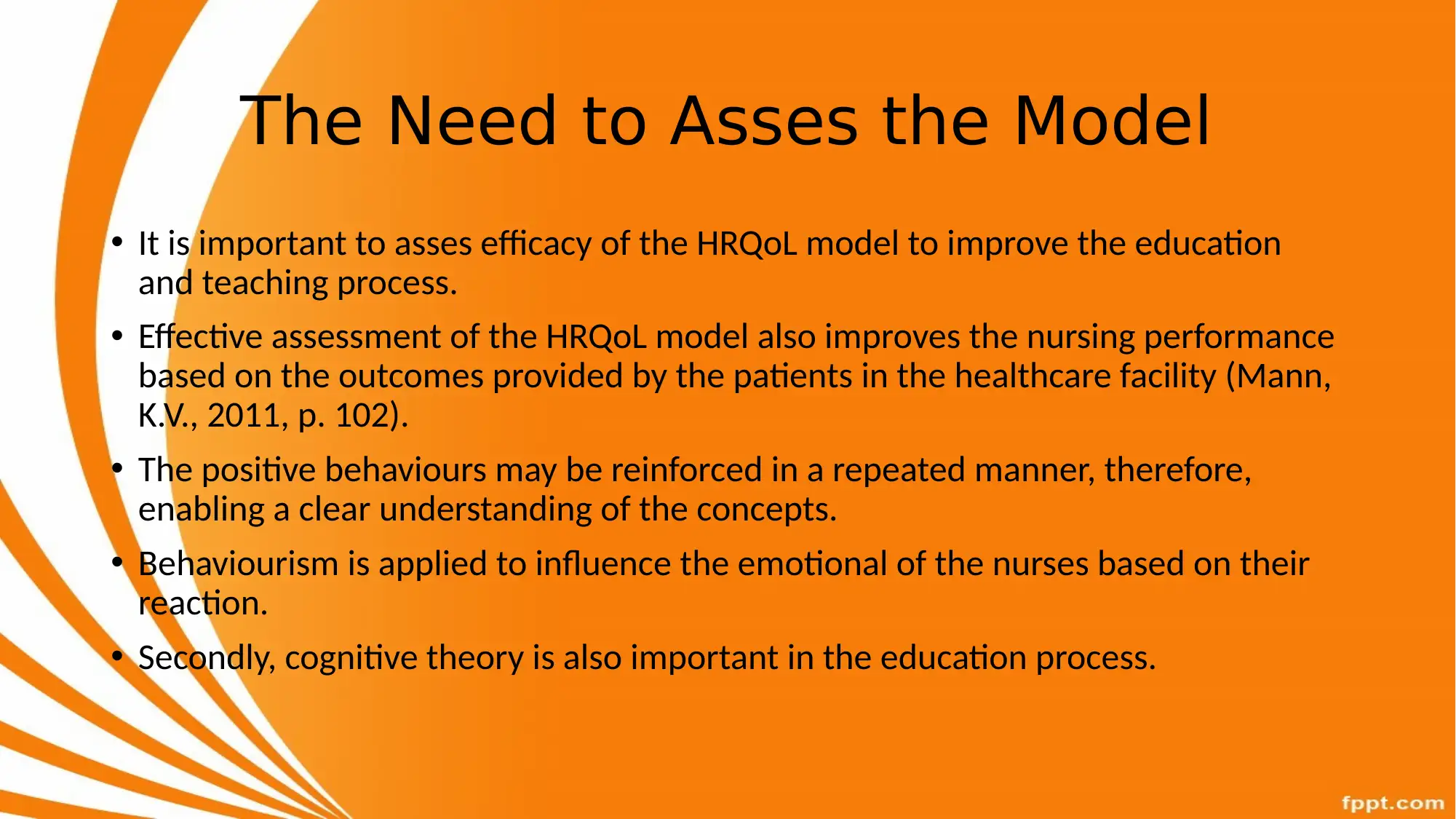
The Need to Asses the Model
• It is important to asses efficacy of the HRQoL model to improve the education
and teaching process.
• Effective assessment of the HRQoL model also improves the nursing performance
based on the outcomes provided by the patients in the healthcare facility (Mann,
K.V., 2011, p. 102).
• The positive behaviours may be reinforced in a repeated manner, therefore,
enabling a clear understanding of the concepts.
• Behaviourism is applied to influence the emotional of the nurses based on their
reaction.
• Secondly, cognitive theory is also important in the education process.
• It is important to asses efficacy of the HRQoL model to improve the education
and teaching process.
• Effective assessment of the HRQoL model also improves the nursing performance
based on the outcomes provided by the patients in the healthcare facility (Mann,
K.V., 2011, p. 102).
• The positive behaviours may be reinforced in a repeated manner, therefore,
enabling a clear understanding of the concepts.
• Behaviourism is applied to influence the emotional of the nurses based on their
reaction.
• Secondly, cognitive theory is also important in the education process.
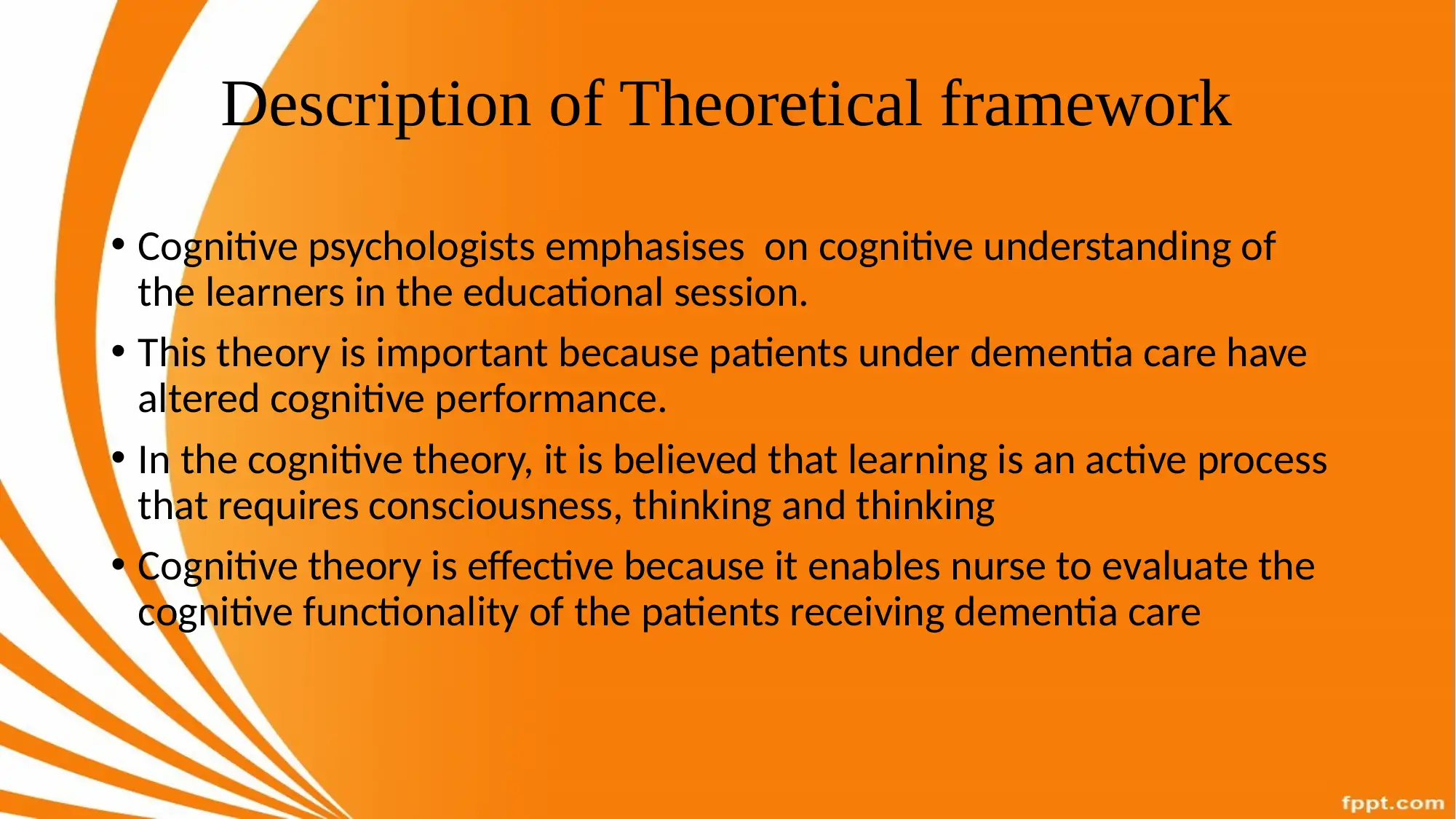
Description of Theoretical framework
• Cognitive psychologists emphasises on cognitive understanding of
the learners in the educational session.
• This theory is important because patients under dementia care have
altered cognitive performance.
• In the cognitive theory, it is believed that learning is an active process
that requires consciousness, thinking and thinking
• Cognitive theory is effective because it enables nurse to evaluate the
cognitive functionality of the patients receiving dementia care
• Cognitive psychologists emphasises on cognitive understanding of
the learners in the educational session.
• This theory is important because patients under dementia care have
altered cognitive performance.
• In the cognitive theory, it is believed that learning is an active process
that requires consciousness, thinking and thinking
• Cognitive theory is effective because it enables nurse to evaluate the
cognitive functionality of the patients receiving dementia care
⊘ This is a preview!⊘
Do you want full access?
Subscribe today to unlock all pages.

Trusted by 1+ million students worldwide
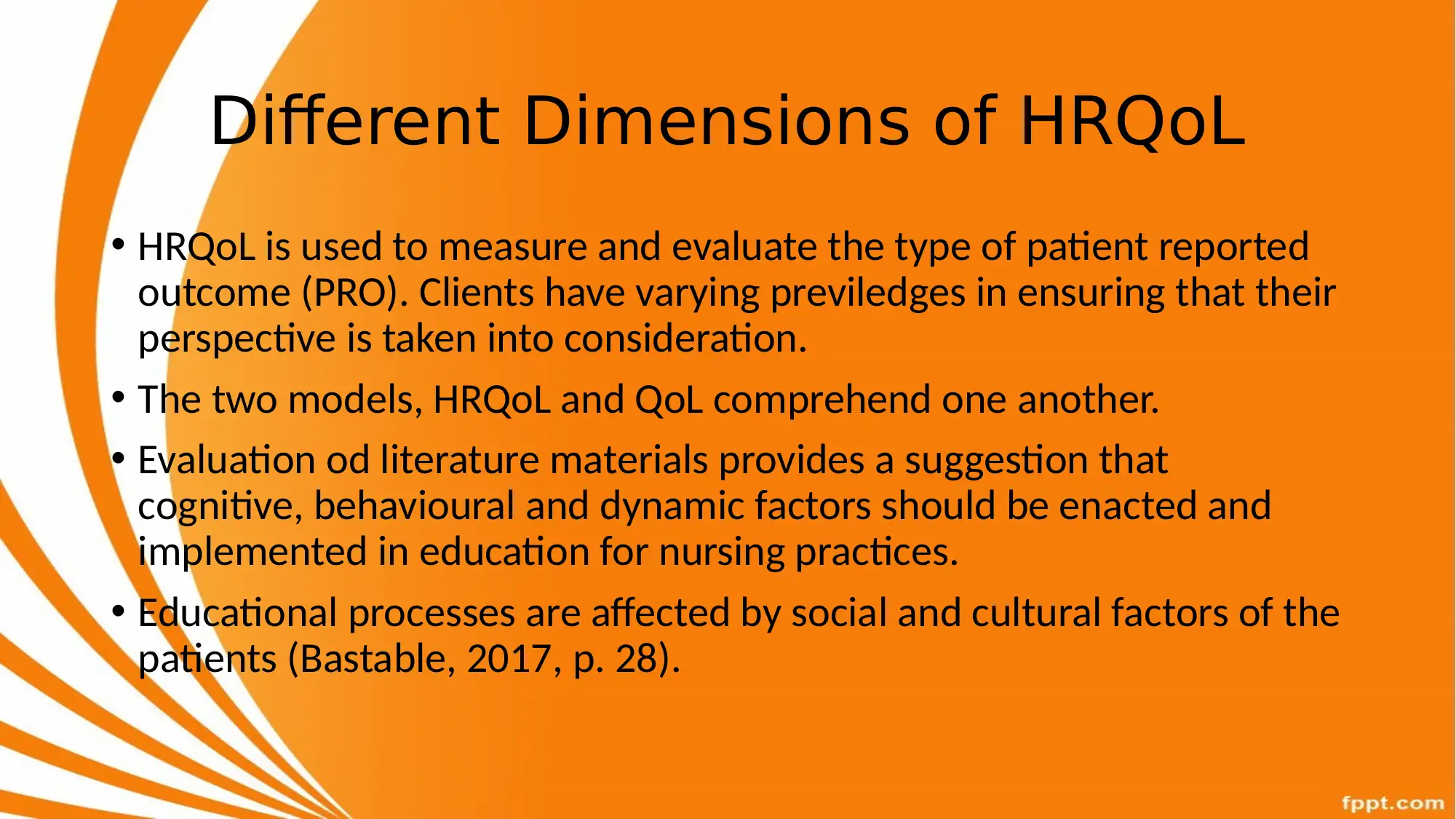
Different Dimensions of HRQoL
• HRQoL is used to measure and evaluate the type of patient reported
outcome (PRO). Clients have varying previledges in ensuring that their
perspective is taken into consideration.
• The two models, HRQoL and QoL comprehend one another.
• Evaluation od literature materials provides a suggestion that
cognitive, behavioural and dynamic factors should be enacted and
implemented in education for nursing practices.
• Educational processes are affected by social and cultural factors of the
patients (Bastable, 2017, p. 28).
• HRQoL is used to measure and evaluate the type of patient reported
outcome (PRO). Clients have varying previledges in ensuring that their
perspective is taken into consideration.
• The two models, HRQoL and QoL comprehend one another.
• Evaluation od literature materials provides a suggestion that
cognitive, behavioural and dynamic factors should be enacted and
implemented in education for nursing practices.
• Educational processes are affected by social and cultural factors of the
patients (Bastable, 2017, p. 28).
Paraphrase This Document
Need a fresh take? Get an instant paraphrase of this document with our AI Paraphraser
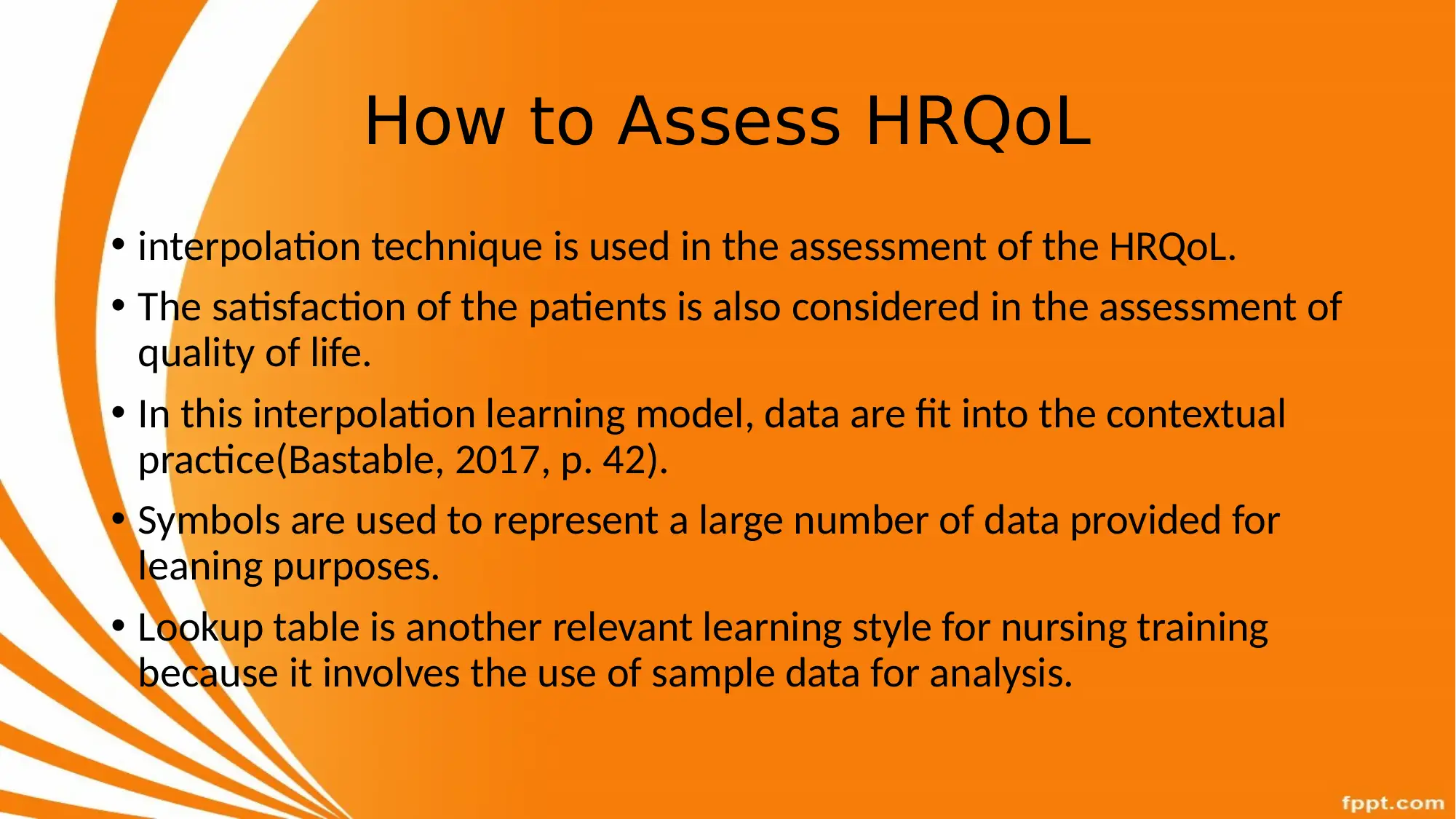
How to Assess HRQoL
• interpolation technique is used in the assessment of the HRQoL.
• The satisfaction of the patients is also considered in the assessment of
quality of life.
• In this interpolation learning model, data are fit into the contextual
practice(Bastable, 2017, p. 42).
• Symbols are used to represent a large number of data provided for
leaning purposes.
• Lookup table is another relevant learning style for nursing training
because it involves the use of sample data for analysis.
• interpolation technique is used in the assessment of the HRQoL.
• The satisfaction of the patients is also considered in the assessment of
quality of life.
• In this interpolation learning model, data are fit into the contextual
practice(Bastable, 2017, p. 42).
• Symbols are used to represent a large number of data provided for
leaning purposes.
• Lookup table is another relevant learning style for nursing training
because it involves the use of sample data for analysis.
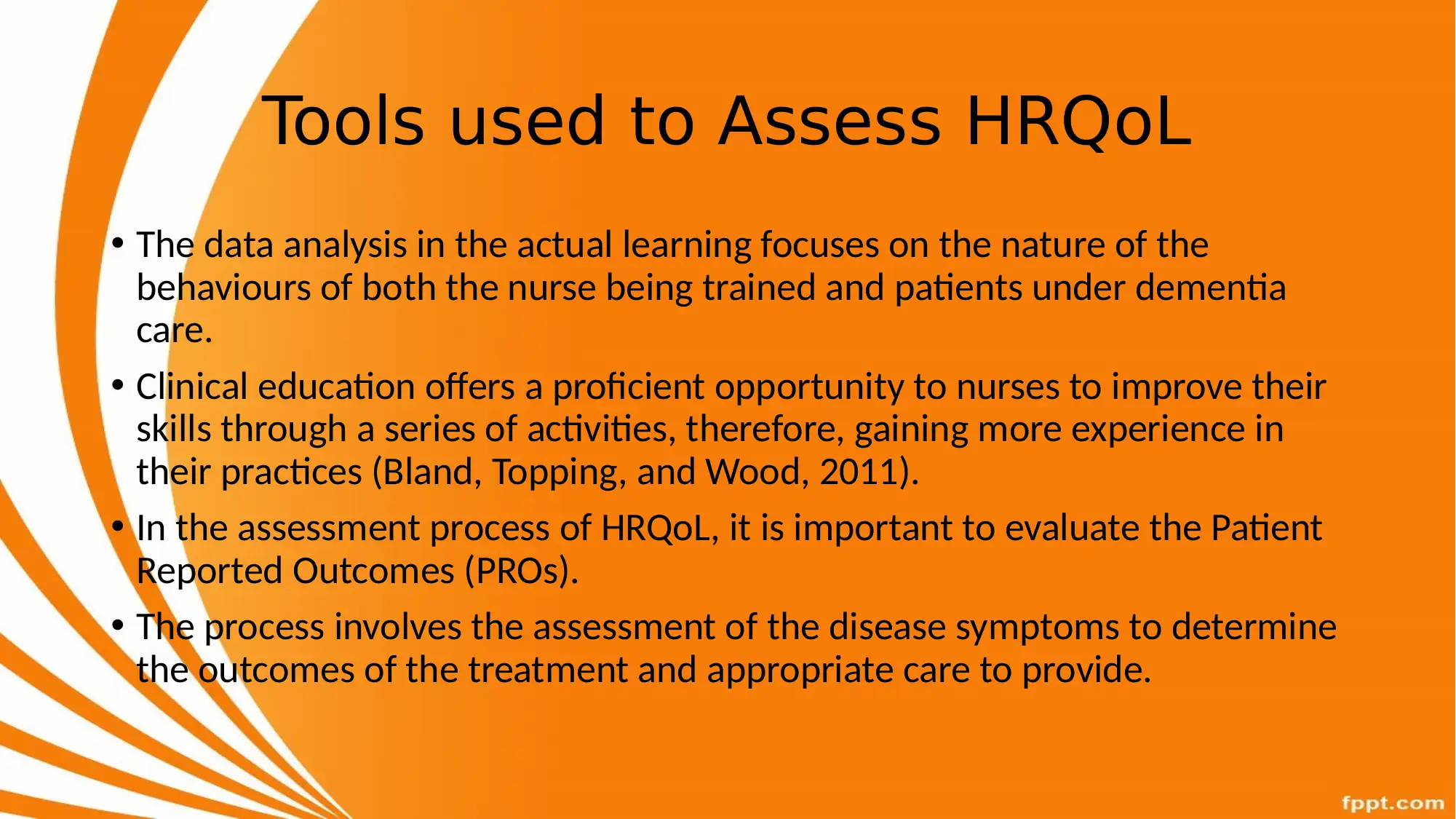
Tools used to Assess HRQoL
• The data analysis in the actual learning focuses on the nature of the
behaviours of both the nurse being trained and patients under dementia
care.
• Clinical education offers a proficient opportunity to nurses to improve their
skills through a series of activities, therefore, gaining more experience in
their practices (Bland, Topping, and Wood, 2011).
• In the assessment process of HRQoL, it is important to evaluate the Patient
Reported Outcomes (PROs).
• The process involves the assessment of the disease symptoms to determine
the outcomes of the treatment and appropriate care to provide.
• The data analysis in the actual learning focuses on the nature of the
behaviours of both the nurse being trained and patients under dementia
care.
• Clinical education offers a proficient opportunity to nurses to improve their
skills through a series of activities, therefore, gaining more experience in
their practices (Bland, Topping, and Wood, 2011).
• In the assessment process of HRQoL, it is important to evaluate the Patient
Reported Outcomes (PROs).
• The process involves the assessment of the disease symptoms to determine
the outcomes of the treatment and appropriate care to provide.
⊘ This is a preview!⊘
Do you want full access?
Subscribe today to unlock all pages.

Trusted by 1+ million students worldwide
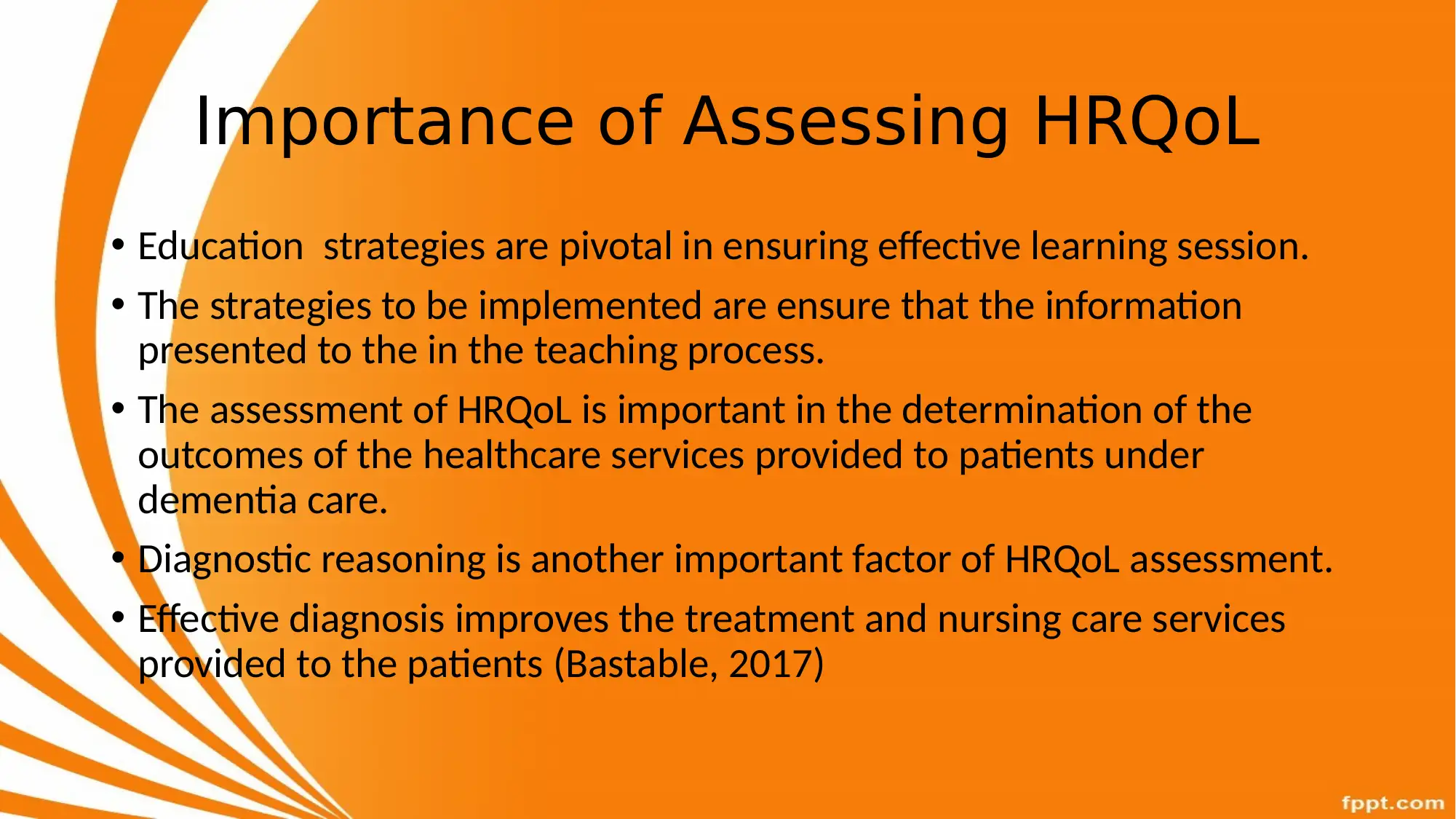
Importance of Assessing HRQoL
• Education strategies are pivotal in ensuring effective learning session.
• The strategies to be implemented are ensure that the information
presented to the in the teaching process.
• The assessment of HRQoL is important in the determination of the
outcomes of the healthcare services provided to patients under
dementia care.
• Diagnostic reasoning is another important factor of HRQoL assessment.
• Effective diagnosis improves the treatment and nursing care services
provided to the patients (Bastable, 2017)
• Education strategies are pivotal in ensuring effective learning session.
• The strategies to be implemented are ensure that the information
presented to the in the teaching process.
• The assessment of HRQoL is important in the determination of the
outcomes of the healthcare services provided to patients under
dementia care.
• Diagnostic reasoning is another important factor of HRQoL assessment.
• Effective diagnosis improves the treatment and nursing care services
provided to the patients (Bastable, 2017)
Paraphrase This Document
Need a fresh take? Get an instant paraphrase of this document with our AI Paraphraser
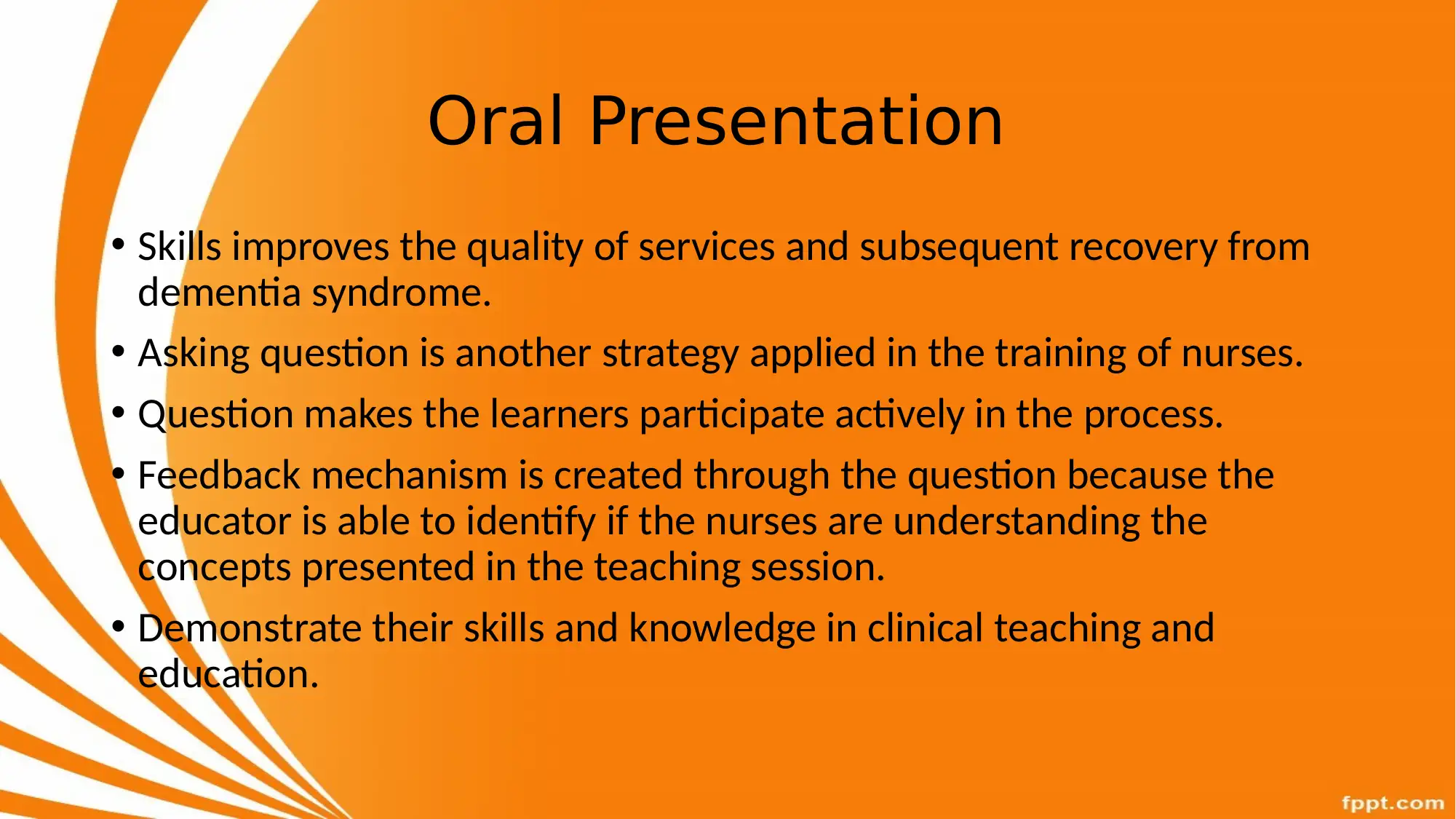
Oral Presentation
• Skills improves the quality of services and subsequent recovery from
dementia syndrome.
• Asking question is another strategy applied in the training of nurses.
• Question makes the learners participate actively in the process.
• Feedback mechanism is created through the question because the
educator is able to identify if the nurses are understanding the
concepts presented in the teaching session.
• Demonstrate their skills and knowledge in clinical teaching and
education.
• Skills improves the quality of services and subsequent recovery from
dementia syndrome.
• Asking question is another strategy applied in the training of nurses.
• Question makes the learners participate actively in the process.
• Feedback mechanism is created through the question because the
educator is able to identify if the nurses are understanding the
concepts presented in the teaching session.
• Demonstrate their skills and knowledge in clinical teaching and
education.
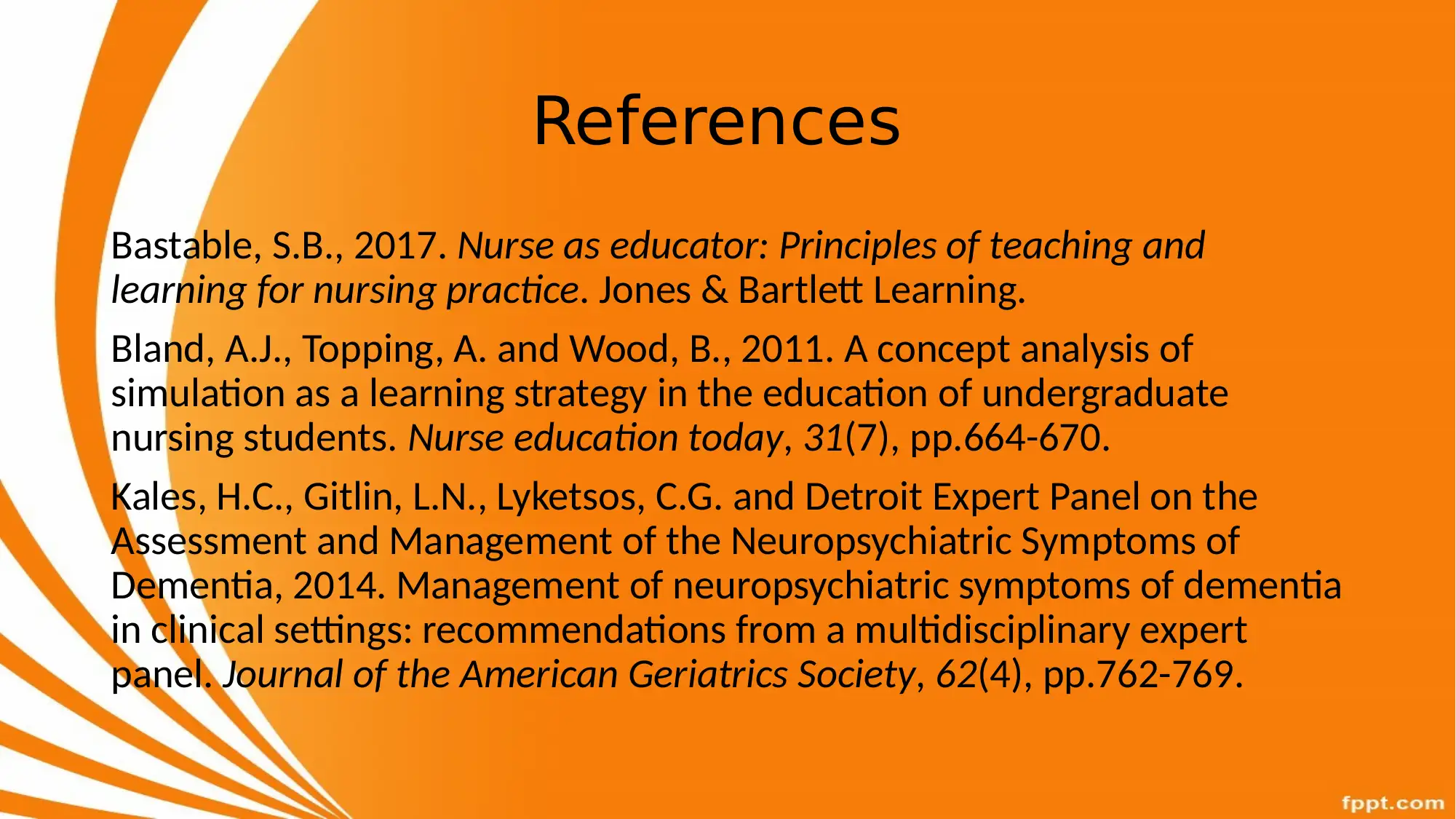
References
Bastable, S.B., 2017. Nurse as educator: Principles of teaching and
learning for nursing practice. Jones & Bartlett Learning.
Bland, A.J., Topping, A. and Wood, B., 2011. A concept analysis of
simulation as a learning strategy in the education of undergraduate
nursing students. Nurse education today, 31(7), pp.664-670.
Kales, H.C., Gitlin, L.N., Lyketsos, C.G. and Detroit Expert Panel on the
Assessment and Management of the Neuropsychiatric Symptoms of
Dementia, 2014. Management of neuropsychiatric symptoms of dementia
in clinical settings: recommendations from a multidisciplinary expert
panel. Journal of the American Geriatrics Society, 62(4), pp.762-769.
Bastable, S.B., 2017. Nurse as educator: Principles of teaching and
learning for nursing practice. Jones & Bartlett Learning.
Bland, A.J., Topping, A. and Wood, B., 2011. A concept analysis of
simulation as a learning strategy in the education of undergraduate
nursing students. Nurse education today, 31(7), pp.664-670.
Kales, H.C., Gitlin, L.N., Lyketsos, C.G. and Detroit Expert Panel on the
Assessment and Management of the Neuropsychiatric Symptoms of
Dementia, 2014. Management of neuropsychiatric symptoms of dementia
in clinical settings: recommendations from a multidisciplinary expert
panel. Journal of the American Geriatrics Society, 62(4), pp.762-769.
⊘ This is a preview!⊘
Do you want full access?
Subscribe today to unlock all pages.

Trusted by 1+ million students worldwide
1 out of 13
Related Documents
Your All-in-One AI-Powered Toolkit for Academic Success.
+13062052269
info@desklib.com
Available 24*7 on WhatsApp / Email
![[object Object]](/_next/static/media/star-bottom.7253800d.svg)
Unlock your academic potential
Copyright © 2020–2026 A2Z Services. All Rights Reserved. Developed and managed by ZUCOL.





